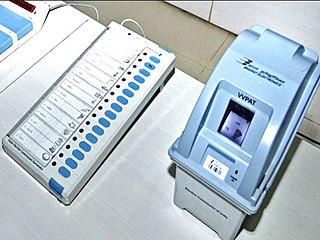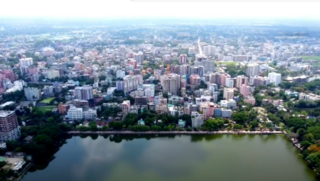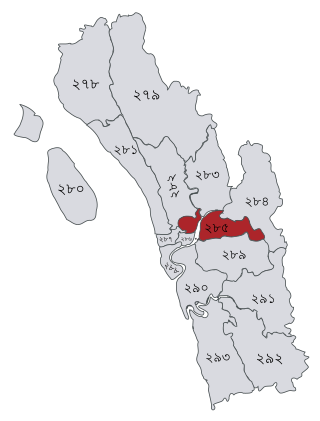Related Research Articles

Electronic voting is the standard means of conducting elections using Electronic Voting Machines (EVMs) in India. The system was developed for the Election Commission of India by state-owned Electronics Corporation of India and Bharat Electronics. Starting in the late 1990s, they were introduced in Indian elections in a phased manner.
India has a parliamentary system as defined by its constitution, with power distributed between the union government and the states. India's democracy is the largest democracy in the world.

Comilla, officially spelled Cumilla, is a metropolis on the banks of the Gomti River in eastern Bangladesh. Comilla was one of the cities of ancient Bengal. It was once the capital of Tripura kingdom. Comilla Airport is located in the Dulipara area of Comilla city. Along with the Comilla Economic Zone EPZ, various industrial factories have come up at the airport, making the airport area a business and commercial city. Comilla City is a division centered city district with surrounding districts coming to Comilla in more diverse areas of work. Bibir Bazar land port is located 5 km away from Comilla city. The area of Comilla City Corporation is 53.04 square kilometers, so the surrounding areas of the main city fall under the jurisdiction of the City Corporation. The urban areas falling outside the city corporation are considered as suburbs with a population of 600,000.

The Bangladesh Election Commission, abbreviated and publicly referred to as EC, is an government controlled constitutional body that operates the legal functions of election laws in Bangladesh.

Bangladesh Machine Tools Factory Limited (BMTF) is a commercial enterprise run under the management of Bangladesh Army. It has 19 dynamic factories engaged in manufacturing a total of 566 products. It is located at Gazipur, about 40 km from Dhaka.

The Bangladesh Premier League (BPL) (Bengali: বাংলাদেশ প্রিমিয়ার লিগ; ISO: bānlādēś primiẏār lig) is a professional Twenty20 cricket league organised by the BPL Governing Council. The BPL is one of the three professional cricket leagues in Bangladesh. It is the 16th most attended premier league in the world. In winter, each team faces the other twice in the league stage. Following the conclusion of the regular season, the top four teams advance to the playoffs, a single-elimination game, and two qualifier games culminating in the Championship game, between the winner of Qualifier 1 and Qualifier 2.

General elections were held in Bangladesh on 30 December 2018 to elect 300 directly-elected members of the Jatiya Sangsad. The result was another landslide victory for the Awami League-led Grand Alliance led by Sheikh Hasina. The elections were marred by violence, and were widely considered by opposition politicians and the international community to be rigged.

The Election Commission of India (ECI) is a constitutional body established by the Constitution of India empowered to conduct free and fair elections in India. The Election commission is headed by a Chief Election Commissioner and consists of two other Election Commissioners.
Totaliser is a proposed mechanism in the voting machines in India to hide the booth-wise voting patterns. A totaliser allows the votes cast in about 14 polling booths to be counted together. At present, the votes are tallied booth by booth.

Dhaka-6 is a constituency represented in the Jatiya Sangsad of Bangladesh since 2024 by Sayeed Khokon of the Bangladesh Awami League.

Chittagong-9 is a constituency represented in the Jatiya Sangsad of Bangladesh since 2018 by Mohibul Hasan Chowdhury of the Awami League.

Brahmanbaria-6 is a constituency represented in the Jatiya Sangsad of Bangladesh since 2008 by AB Tajul Islam of the Awami League.

Comilla-6 is a constituency represented in the Jatiya Sangsad of Bangladesh since 2008 by A. K. M. Bahauddin Bahar of the Awami League.

Comilla-10 is a constituency represented in the Jatiya Sangsad of Bangladesh since 2008 by Mustafa Kamal of the Awami League.

Rangpur-3 is a constituency represented in the Jatiya Sangsad of Bangladesh. GM Quader is the current MP of this constituency.

Chittagong-8 is a constituency represented in the Jatiya Sangsad of Bangladesh. The incumbent Member of Parliament (MP) of this constituency, Abdus Salam.

Bhola-3 is a constituency represented in the Jatiya Sangsad of Bangladesh since 2010 by Nurunnabi Chowdhury of the Awami League.

The 2020 mayoral election of Dhaka North City Corporation was held on 1 February 2020. A total of 6 candidates participated in the election. The result was a victory for the Awami League candidate Atiqul Islam. However, the results were rejected by the main opposition candidate, Tabith Awal of Bangladesh Nationalist Party.
Bangladesh election commission scandal of 2020 is the revelation of a series of corruption allegations, moral degradation of the commissioners and evidence of gross misconducts before and after the controversial 2018 Bangladeshi general election and 2019 Upazila polls in Bangladesh. Allegations included the misappropriation of around 20 million Bangladeshi taka for imaginary programs, embezzlement of 40.8 million BDT during the recruitment process of election commission staffs, purchasing the electronic voting machine at a higher price than the market rate, usage of extra cars by three election commissioners flouting rules and facilitating continuous and numerous election fraud by not investigating credible allegations of irregularities during the 11th Parliamentary Election and elections in Dhaka North and Dhaka South City Corporations, Khulna City Corporation, and Gazipur City Corporation.

The 2020 mayoral election of Dhaka South City Corporation was held on 1 February 2020. A total of 6 major candidates participated in the election. The result was a victory for the Awami League candidate Sheikh Fazle Noor Taposh. Ishraque Hossain of the Bangladesh Nationalist Party received the second highest number of votes.
References
- ↑ "EVM better than ballot, say experts". UNB.
- 1 2 3 ইভিএম কী? কীভাবে এলো? ব্যবহার কতটা নিরাপদ?. Jugantor (in Bengali). Retrieved 2018-09-02.
- ↑ "EVM at 6 constituences". The Daily Star. 14 November 2018.
- ↑ "E-voting machine to work just fine". The Daily Star. 28 October 2011.
- ↑ ইলেক্ট্রনিক ভোটিং মেশিন : জানা-অজানা. The Daily Sangram (in Bengali). Archived from the original on 11 September 2019. Retrieved 2018-09-02.
- ↑ ইভিএম প্রদর্শন, ভোটদানের পদ্ধতি শেখাবে ইসি. banglanews24.com (in Bengali). Retrieved 2018-09-02.
- ↑ "BNP to take programmes against EVM". New Age.
- ↑ "People not ready to cast vote using EVMs: Tabith". The Daily Star. 16 January 2020.
- ↑ "EC to buy 2,535 new EVMs at four times the cost of previous models". Dhaka Tribune. 13 May 2018.
- ↑ "EC to use EVM on large scale in Comilla polls". The Daily Star. 3 November 2011.
- ↑ "Bangladesh Uses EVMs For First Time in General Election". The Economic Times. 30 December 2018.
- ↑ "Training to polling officials on use of EVMs on December 14, 15". Dhaka Tribune. 7 December 2018.